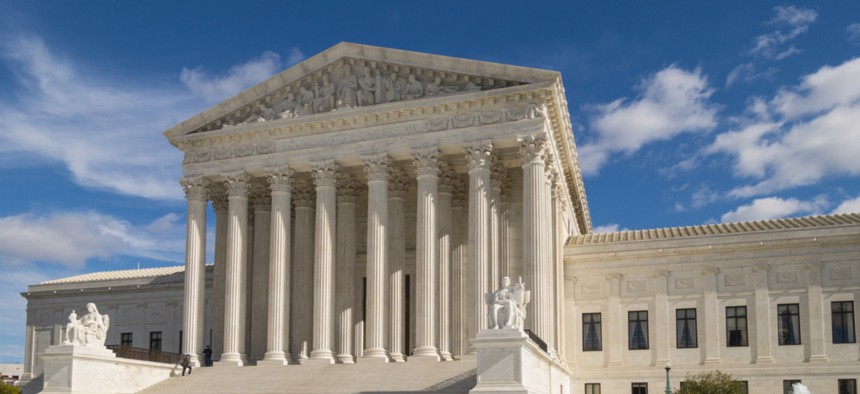Supreme Court Decides Against Public Worker Unions in Fee Case

The U.S. Supreme Court Shutterstock
The 5-4 decision found that charging non-union employees "agency fees" is a First Amendment violation.
See this story on Route Fifty for more perspectives on what the Supreme Court's decision will mean for public sector unions.
Dealing what’s widely seen as a blow to organized labor, a divided U.S. Supreme Court ruled on Wednesday that forcing state and local government employees to pay union fees is an unconstitutional infringement on their right to free speech.
The 5-4 decision in Janus v. American Federation of State, County, and Municipal Employees, Council 31 means that state and local government workers who choose not to join a union cannot be required to pay “agency” or “fair share” fees that help cover the union's operational costs, but not its political activities.
Leading up to the court’s ruling, 22 states permitted such fees, while 26 did not, and two allowed them under some circumstances.
Justice Samuel Alito wrote the majority opinion for the court. "The First Amendment is violated when money is taken from non-consenting employees for a public-sector union," it said.
The First Amendment issue here is rooted in the fact that employees are required to financially support the union, even though they may disagree with the positions it takes with bargaining or other activities.
Chief Justice John Roberts, along with justices Anthony Kennedy, Clarence Thomas and Neil Gorsuch joined Alito in the majority. The dissenting justices included Sonia Sotomayor, Elena Kagan, Stephen Breyer and Ruth Bader Ginsburg.
"The court did exactly what we wanted it to," said Jacob Huebert, a lawyer for Mark Janus, the state child welfare specialist in Illinois who pursued the case. "It was really the best result we could have hoped for."
Union leaders blasted the court's decision, and said the Janus case had been driven by special interest groups intent on doing damage to organized labor.
“From the very beginning, the Janus case was about one thing and one thing only: corporate CEOs and wealthy special interests rigging the economy even more in their favor,” AFSCME president Lee Saunders told reporters. “Today, the Supreme Court has shown that it is part of a rigged system.”
Saunders said that, despite the court ruling, public support for unions has been on the rise.
“We’re not defeated," he added. "We are emboldened.”
Huebert, who is director of litigation at a group known as the Liberty Justice Center, pushed back on the premise that the decision was a win for powerful interests.
"People lose sight of the fact that the plaintiff in this case is an individual worker who is looking to protect his own First Amendment rights," he said.
"This is a victory for individuals," Huebert added.
Liberty Justice Center is affiliated with the Illinois Policy Institute, a group backed by wealthy conservative donors.
Employees who are not union members, but who work in unionized workplaces, have until now paid agency and fair share fees.
The idea is that while these workers are not part of the union, they still benefit from the union’s collective bargaining and administrative activities and should pay a portion of those costs. The fees are not supposed to go toward covering a union’s political advocacy expenses.
Proponents of the fees say that eliminating them creates the risk of a “free-rider” problem, where people opt out of paying into the union, but still benefit from its services. This, in turn, creates the possibility that unions could have their finances eroded.
A legal precedent allowing for agency fees was established in the 1977 Supreme Court case Abood v. Detroit Board of Education. “A public employee who believes that a union representing him is urging a course that is unwise as a matter of public policy is not barred from expressing his viewpoint,” said the court’s opinion in that case.
Wednesday’s decision overturns Abood.
"Employees must choose to support the union before anything is taken from them," Alito wrote. "Accordingly, neither an agency fee nor any other form of payment to a public-sector union may be deducted from an employee, nor may any other attempt be made to collect such a payment, unless the employee affirmatively consents to pay."
The Janus case has its origins in 2015, when Illinois Gov. Bruce Rauner, a Republican, issued an executive order instructing state agencies to end the enforcement of fair share fee contract provisions. Rauner also filed a lawsuit, charging that the fees were unconstitutional.
In Illinois, AFSCME represents about 65,000 public workers, including corrections officers, firefighters, crime scene investigators, clerical employees and child welfare specialists. The union negotiates with the state over issues like wages, overtime, and safety.
Janus, who was required to pay fair share fees, intervened in Rauner's lawsuit along with two other state workers who weren’t union members. A federal judge ruled that Rauner did not have standing to bring the court case. But Janus’s court challenge advanced.
"There is no sugarcoating today’s opinion. The majority overthrows a decision entrenched in this Nation’s law— and in its economic life—for over 40 years," Kagan wrote in the court's dissenting opinion.
"And it does so by weaponizing the First Amendment, in a way that unleashes judges, now and in the future, to intervene in economic and regulatory policy," she added.
Bill Lucia is a Senior Reporter for Government Executive's Route Fifty and is based in Washington, D.C.
NEXT STORY: Maine Tried a New Way of Voting. Will Other States Follow?






